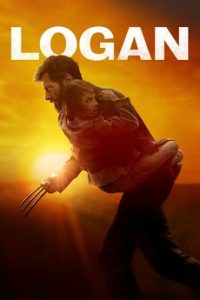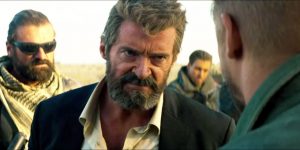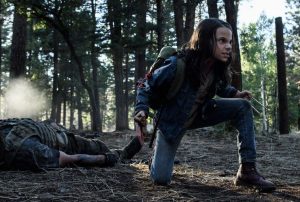One of Marvel Entertainment’s newest films for action-seeking viewers is Logan and that is what it may look like on the surface, a film for thrill-seeking Wolverine, and more generically, X-Men fans that are looking for their satisfactory dose. However, this film also displays a general conclusion from Richard Dyer’s chapter “Entertainment and Utopia” in the book Only Entertainment. The conclusion from Dyer’s chapter is that entertainment exemplifies facets of a better world to us as viewers. The movie does seem to underscore something that is entirely unrelated to the slashing and killing of Wolverine’s usual victims, individuals that are typically against and trying to takeover human society. This film provides a bit of a twist though, rather than the dignity and prominence of humankind being in jeopardy, it is the mutants who are condemned, strictly because of their differences from humans.
Logan is a film that stars Hugh Jackman as an old, washed-up version of Wolverine. Initially, he is trying to live a fairly normal human life, aside from his occasional trips across the border to aid Professor Xavier, as old age is taking its toll on him as well. The trick to this film is that there are new mutants that are ultimately genetic descendents of those prior, like Wolverine. Though these mutant children are held captive in the confines of the hospital that they are ‘engineered’ and raised in, they still retain many basic human qualities, as they are practically a family, which leads one nurse to want to spare their lives. This is what really leads to the chaos that ensues throughout the remainder of the film. These mutant children are released into the world, they’re given a sense of hope, they just need to get to Eden, which is where they seek to congregate prior to achieving safety. Before I go on, I want to recognize that their are religious resemblances in this film, but those are deserving of a different exploration entirely.
Continuing on, what really sets the movie in full swing is one girl in particular, Laura, who is genetically similar to Logan. She’s the ‘person of interest’, using the term in its most literal sense. Those tracking her, as well as the other mutants, act as if they’re going to save the world by recapturing them, as if they’re saving the world from some utterly destructible force(s). They make themselves seem like they’re the heroes and once they realize that Laura and Logan are linked, that’s when all hell breaks loose.
To any novel Marvel fan, this may seem like the next great film, a film of continuous and inescapable action-packed fighting. Honestly, that isn’t necessarily a false statement. The question I then ask though is, who are they fighting against? It is clear that they are fighting for their own survival, as one would expect them to. Right from the beginning of the film, we are instantly led to side with the mutants, pulling for them for the entirety of movie. But do we recognize who we are pulling against? The answer to these two previously asked questions is humankind, our own kind. And what do the mutants represent? They represent those people who are different from the mass population. Logan, who is clearly still mutant, provides a simplistic example of how they differ from the general population right at the beginning of the film when he’s awaken by men trying to remove pieces from his car. Initially he tries to handle the situation humanely, but these men fight back, which cues the inevitable… out come the claws … and the rest is history.
The journey for Logan, Laura, and, at least for some time, Professor Xavier begins as they begin their trek towards Eden, a trek that Logan himself is skeptical of and initially doesn’t see as worthy. His human-side has taken a toll on him. Mentally, he has shifted out of the mutant mindset, going off of the idea that few, if any, mutants even exist anymore. That’s one of the reasons he doubts that Laura is even worth their time from the beginning. His human side, and his want for normalcy, leads him to move away from seeing himself as a mutant, as Charles Xavier is really his remaining point of connection, while it also guides him to conform to their standards; I mean, why would a ‘former’ superhero become a driver for people? Other than that, he seems disinterested in his mutant past and the possibility that there are still mutants who do exist.
As the movie progresses, however, Logan realizes that he may be the last sense of hope that mutants have. He may be the only one who can help save them and prevent them from being extinguished from society, from being removed and dictated by humankind. After all, many of the remaining mutants are only children, who lack the leadership and brute strength to fend off their oppressors. The injustice shown towards certain people is no stranger to the real world as well and, unfortunately, for some, the world would be a better place without a particular race, religion, or social group.
In our world today, including the past, there are plenty of examples of social and religious extremist groups that seek to get rid of certain populations and cause disruption entirely. From their perspective, the world is a better place without these people or they see them as some kind of threat to their ideal society. They’d rather live in a world, bluntly, where these people don’t exist, which is part of their own personal utopias. As is the case in Logan, humankind is trying to restrict and maintain mutants, seeing them as a threat to their states of ideality. Think about the Nazi’s for example. In the mid-1900’s, they believed, or at least some believed and others followed suit, that the extermination of the Jewish population would resolve many of the issues of their world, which is incomprehensible in its own right. But a similar situation is prevalent in Logan as well. Humans act as if the world would be a better place if mutants were extinguished. But is that what the film is really showing us?
In Mikhail Lyubansky’s article “The Racial Politics of X-Men”, he states that “the viewer is expected to ultimately accept the assumption that it is the mutants (and, by extension, gays, lesbians, and people of color) who must somehow make themselves fit into mainstream society”. Keep in mind that this is regarding prior X-Men movies before Logan, but as they are predecessors of the film, you’d think some themes would still apply. However, as viewers of Logan, this doesn’t necessarily seem to be the case. Interestingly enough, Logan does initially seem to conform to societal standards, but that doesn’t explain his eventual return to his mutant side. If we, as viewers, were expected to interpret this movie in the fashion that Lyubanksy argues of the other X-Men films, then why would they even put up the fight? If these are the last remaining mutants, then why don’t they succumb to ordinary society and their oppressors? It’s because they shouldn’t be expected to.
Lyubansky also argues that, “Xavier’s mindset would’ve blamed Jews in Nazi Germany and Blacks in the antebellum South for their victimization–and would’ve expected them to make accommodations for the sake of peace”. If that were the case in this film, however, then why would Xavier want Logan to take care of and help Laura, especially if he could anticipate that it would cause further disruption, the opposite of peace.
What really throws this whole idea for a spin is that the mutants are the ones who prevail. They fend off those who have an ideal world where mutants don’t exist, those who seek more power and control. The mutants do this in defense of the continuation of their own selves. So then, what is the film really showing us? It clearly isn’t that the removal of different types of people is the answer. If that was the case, then humankind would’ve simply defeated the mutants. We, as viewers, are then proposed an entirely different set of utopian standards and expectations. Through the success of the mutants, who I remind you are the ones being oppressed, just as white supremacists attempt to oppress African-Americans, we can see an entirely different answer to this film’s image of a utopian world. Logan, who serves as the leader in the fight against those who are trying to rid the world of mutants, is a Martin Luther King Jr. esque figure in this film. He eventually comes to realize the injustice that is being shown towards mutants and conjoins with the others to fight it together. That pushes us as the viewers to see something much different, a world that is built and structured off of equality and justice, where no one should be subjugated due to their uncontrollable differences from the overarching masses.
As the battle concludes and ultimately Logan himself is killed and buried, many of the kids, whom he has touched through his leadership and will to fight, including Laura, hold a burial ceremony. Initially, they create and place a cross at the head of his grave. But, as everyone proceeds to leave the scene, Laura emotionally turns that cross to an ‘X’, signifying that their fight as mutants for respect continues, that the fight must continue, even if their most trusted leader has been defeated. One thing I didn’t initially realize but was introduced to through Ignatiy Vishnevetsky’s critical analysis of Logan titled “A cross on its side: Logan gets religion” is that Logan’s “relationship to Laura could almost be called a religious relationship. She’s Logan’s afterlife”. He sacrificed his own self for the mutant children, especially Laura, considering all that he went through for her, so that they could live there lives and have their own experiences in the world, so that they could carry on the mutant ‘species’.
From the mind of an oppressor, the extinguishing of a different culture, religion, class, race, etc will lead to a better world, or else why would they be so driven to try and get rid of these people? But Logan shows us something else. The mutants, who symbolize those different cultures, religions, and races succeed. They fend off their oppressors… and that’s the nice way of putting it. What Logan really displays to us is that a utopia can be achieved by standing up to the cultural, racial, and religious oppressing mindsets, that a better world is achieved through consistent unity between individuals, ignoring whatever differences that they may have. Ultimately, Logan shows us a different way that we can see the world, a way that the world can be made more utopian. I mean many of us were cheering for the mutants right from the beginning, cheering for the outsiders. We wanted those who had differences to succeed and defeat those who were treating them unjustly… and claws aren’t needed to do that.
*This essay was read by Cory Lund. It is not a first draft.
Works Cited
Dyer, Richard. Only Entertainment. Routledge, 1992.
Lyubansky, Mikhail. “The Racial Politics of X-Men.” Psychology Today, Sussex
Publishers, 5 June 2011, www.psychologytoday.com/blog/between-the-lines
/201106/the-racial-politics-x-men.
Mangold, James, director. Logan. Marvel Entertainment, 2017.
Vishnevetsky, Ignatiy. “A Cross on Its Side: Logan Gets Religion.” Film,
Film.avclub.com, 7 Mar. 2017, film.avclub.com/a-cross-on-its-side-logan-gets-religion-1798258715.


